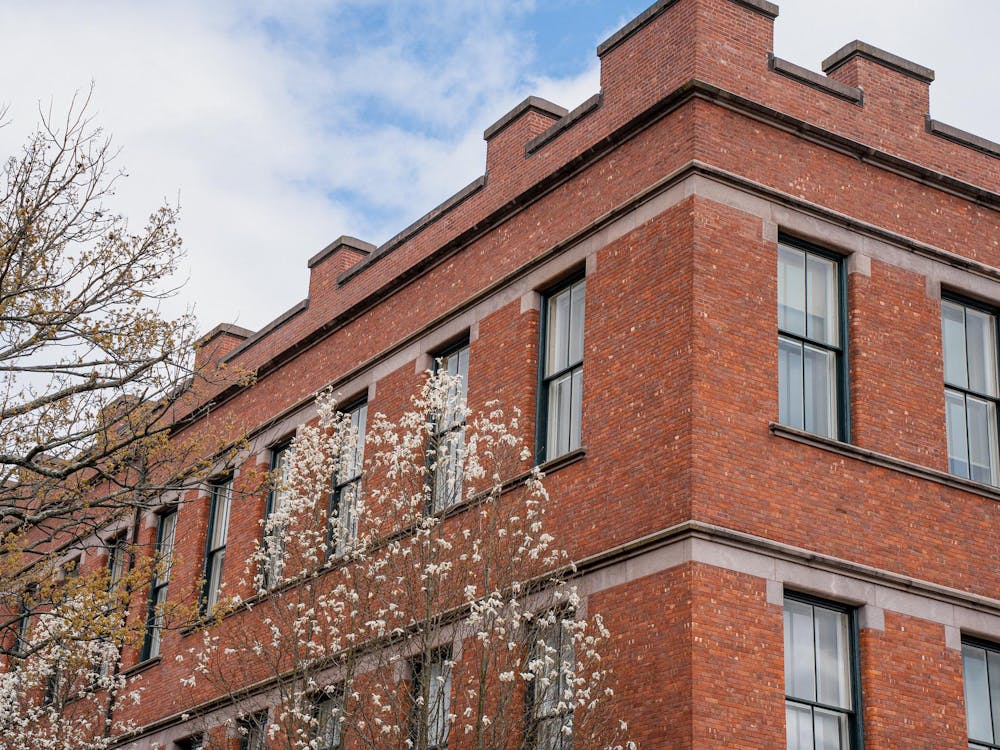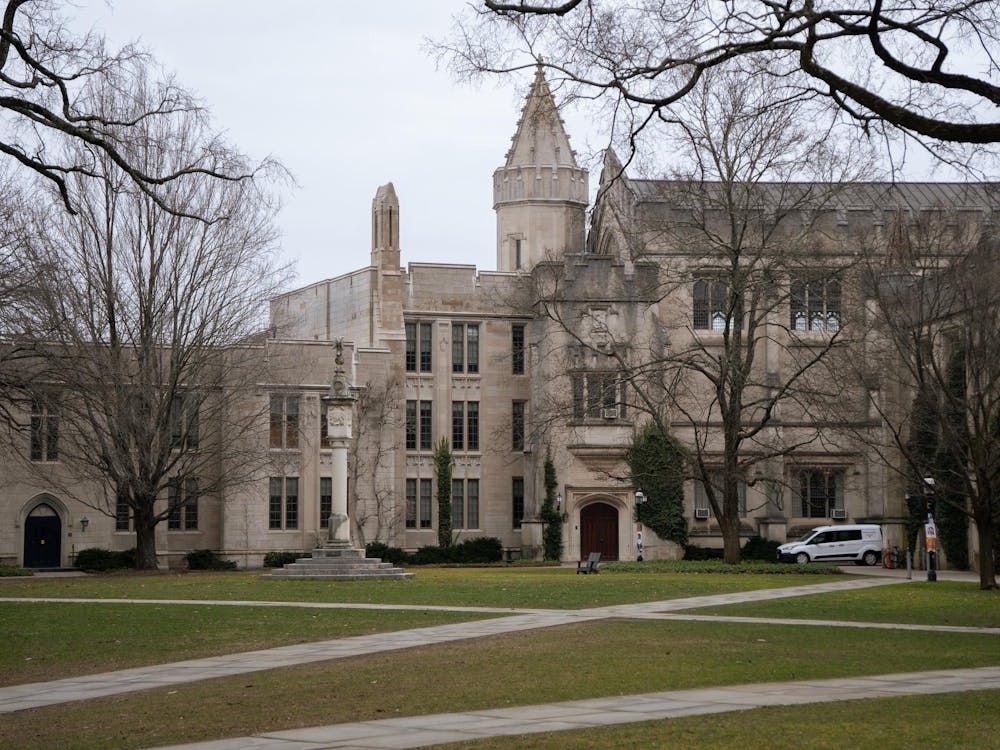In 1998, Amy Barrett, then a law student at Notre Dame, co-wrote a paper for the Marquette Law Review about whether Catholic judges should recuse themselves from capital punishment cases if their religious convictions should render them unable to impartially uphold the law. Almost 20 years later, Barrett, now a law professor at Notre Dame and an appellate-court nominee, is under scrutiny for her religious views, largely due to this same paper.
“The dogma lives loudly within you,” Democratic Sen. Dianne Feinstein told Barrett during a Senate Judiciary Committee hearing, in which senators typically question nominees about their judicial philosophies. Some Democratic senators drew criticism after questioning Barrett about her Catholic faith during a hearing on Sept. 6. In response, President Eisgruber wrote a letter to the Republican chair, Chuck Grassley, and the ranking Democrat, Feinstein, in which he criticized Feinstein and others for interrogating Barrett about the religious and spiritual foundations of her jurisprudential views. The senators seemed concerned that such influences might be invoked in abortion cases.
Not everyone shares Eisgruber’s conviction that the questioning violated a fundamental principle of the Constitution: that people should not be subject to discrimination on the basis of the spiritual foundation of their views.
“I’m quite surprised that someone of that stature and past writing would raise objections based on what appears to be a very appropriate line of questioning for a candidate who has written that a judge needs to be more true to her religious belief than to the Constitution,” said Nan Aron in an interview with The Daily Princetonian. Aron is founder and president of Alliance for Justice, a progressive judicial advocacy group that monitors and reports on federal judicial appointments.
“I only wish that President Eisgruber had taken the time to adequately study her record and her comments before making his criticism,” said Aron. “In fact, a review of her record suggests that not only were [these question about her faith] entirely appropriate, but critically important ones to be raised at her hearing.”
Barrett’s paper caused a furor because Senate Democrats seemed to misunderstand the argument, according to Matthew Franck, a visiting politics lecturer at Princeton and director of the Center on Religion and the Constitution at the Witherspoon Institute.
“Did they really not get the point that [Barrett and John Garvey, her co-author] were making or did they willfully distort it?” Franck added.
Catholic judges are in a bind, begins Barrett’s paper “Catholic Judges in Capital Cases.” “They are obliged by oath, professional commitment, and the demands of citizenship to enforce the death penalty. They are also obliged to adhere to their church’s teaching on moral matters,” she wrote. So the question, in Barrett’s view, becomes the following: What ought a trial judge, whose duty might include sentencing a criminal to execution, do if they believe that the death penalty is wrong?
“Their answer is that the judge must not twist the law to reach the moral outcome of striking down the death penalty as unconstitutional, and in their view the death penalty is not unconstitutional,” explained Franck. “The duty of the judge is to recuse himself.”
“I believe that the views expressed in [“Catholic Judges in Capital Cases”] are fully consistent with a judge’s obligation to uphold the law and the Constitution,” wrote Eisgruber, a constitutional scholar with expertise on religious freedom and judicial appointments.
“It’s very important that we have set in place a set of practices in this country that respect the ability of people to raise their voices about important topics without being subjected to questioning that focuses to the spiritual foundations of their beliefs,” he told the ‘Prince,’ adding that Barrett’s hearing was of special concern not only as a matter of religious freedom, but also as a matter of free speech and academic freedom.
Aron “vehemently disagrees” with Eisgruber’s statement that Barrett is qualified for federal judgeship.

“She was not selected by President Donald Trump based on her qualifications but rather based on her writing, suggesting that the duties of a Catholic judge are to be true to his or her religious beliefs,” she said.
For judges to recuse themselves from cases because they disagree with the law on the basis of religion is “the definition of putting faith ahead of one’s duties as a judge,” according to Aron.
Feinstein, Illinois senator and Minority Whip Dick Durbin, and Hawaii Sen. Mazie Hirono caught the public’s attention after questioning Barrett about her Catholic faith during the hearing.
“Do you consider yourself an orthodox Catholic?” asked Durbin, who later released a statement defending his question because Barrett has “been outspoken…. [S]he has taken on the tough challenge of how a person with strong religious beliefs becomes a judge and looks at American law. So I think she has fashioned herself somewhat of an expert.”
“I think your article is very plain in your perspective about the role of religion for judges, and particularly with regard to Catholic judges,” said Hirono, who asked Barrett if she would recuse herself as a “Catholic judge from death penalty cases.”
“I would recuse myself and not actually enter the order of execution. That was the only conclusion the article reached. And I would stand by that today,” Barrett responded.
In his letter, Eisgruber wrote that “the questions directed to Professor Barrett about her faith were not consistent with the principle set forth in the Constitution’s ‘no religious test’ clause.”
He cited Article VI, which prohibits the use of religious tests as a prerequisite for public office, and the Supreme Court’s decision in Torcaso v. Watkins, which reaffirmed that the First and Fourteenth Amendments prohibit states and the federal government from requiring religious tests for public office.
“[The Anti-Establishment Clause, the No Religious Test Clause, and the Fourteenth Amendment] are rightly interpreted to prohibit discrimination against persons in the selection of officers … on basis of the spiritual foundations of their convictions,” said Eisgruber in an interview with the ‘Prince.’ “I believe that’s what the constitution says. It states a principle.”
Aron, however, says the objection is an “inventive excuse.” Barrett instead raised the question of whether or not her Catholic faith would guide her judicial decision, according to Aron.
“She put the issue in play, not us,” said Aron. “The principal reason Barrett was selected by the administration was her outspoken and clear views of abortion.”
Feinstein, expressing concern over Barrett’s views on abortion, questioned the nominee about whether Roe v. Wade has a super-precedent status, meaning it is unlikely to be overturned. Barrett said that it did. She has been critical of Roe in the past, according to a report by Alliance for Justice.
According to Franck, the worry of Democratic senators like Feinstein is that “maybe deep down they suspect that decisions like Roe and Obergefell v. Hodges are not themselves honest results of honest inquiry into the meaning of the Constitution, and they’ll do whatever it takes to defend them. That’s the main story as I see it.”
Aron counters that claim, holding that the questioning was justified. “Isn’t it in the best interest of our system of justice that we have judges and justices who are open-minded and fair, as opposed to people who are dogmatically anti-abortion?” Aron asked. “It sends a chilling message to any litigant raising a claim — sex discrimination, lack of access to reproductive services — that the judge before whom they appear has already made up her mind.”
“I’m not very optimistic about what’s going on at the Supreme Court level,” Eisgruber told the ‘Prince,’ “and part of it is because the polarization both in our politics generally and around judges has become greater … It’s become really hard to define what counts as a ‘moderate’ and people on each side seem to refer to virtually everybody on the other side as, in their view, extreme.”








